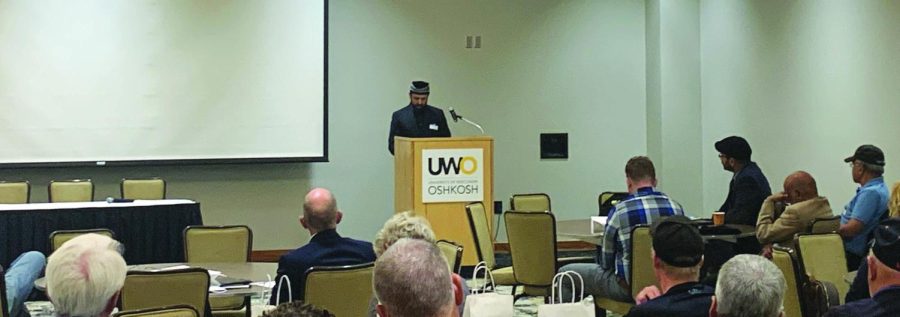Fighting for peace
The Ahmadiyya Muslim Community urges to ‘Stop WW3’
Photos: Josh Lehner / The Advance-Titan– Ahmed Khan speaks on the impending catastrophe of the Doomsday Clock and global nuclear war.
September 28, 2022
The Ahmadiyya Muslim Community called for peace and justice to fight against the threats of nuclear war during a seminar last week aptly titled “Stop WW3.” The Ahmadiyya Muslim Community, which serves as the leading Islamic group to reject terrorism and highlight peace, justice and the sancity of life, focused their seminar on the precarious nature of modern global politics, comparing it to the situation of pre-World War I Europe.
“This decade is reminiscent of the decade right before 1914,” said Michael Jasinski, a professor of political science at UW Oshkosh.
Jasinski characterized this pre-war period as a time of peace and optimism.
“Between 1900 and 1914, we invented the telegraph, motion pictures and all kinds of other technologies,” he said. “It seemed like the human race would live happily ever after. And then you have [the assassination of Archduke Franz Ferdinand],” which began the first World War.
Jasinski compared pre-World War I Europe to global affairs post-1990. In 1989, the Berlin Wall fell, and with it came an era of relative peace. Jasinski served in the military during this time. “We thought to ourselves, ‘We’ve done the job.’ Turns out that wasn’t true. After that decade of peace, you have [9/11] and the Iraq War.”
Jasinski said that the world’s superpowers were not very well defined leading up to 1914 — a stark contrast to the Cold War, where the United States and the Soviet Union unilaterally pulled the strings of world affairs.
But the ambiguity of superpowers in 1914 served as prime conditions for countries to try and assert their dominance.
Jasinski said he believes that our modern global conflict is equally ambiguous, with rising superpowers itching to acquire nuclear arsenals and find their place on the global stage.
While Jasinski said that nuclear weapons will also serve as a deterrent to war, the threat of nuclear war is still a chilling reality.
Ahmed Khan, an Ahmadiyya Muslim who spoke on the necessity of peace, referenced the Doomsday Clock, a metaphorical clock that represents the likelihood of a man-made global crisis.
A crisis is represented by the clock striking midnight. This year, a group of atomic scientists placed the clock at 100 seconds before midnight.
The Doomsday Clock doesn’t only represent the threat of nuclear war, however. Climate change and other forms of conflict, such as the Russia-Ukraine War, are also considered. And crises like the Russia-Ukraine War are cause for concern, as they raise the political temperature and muddy the waters of foreign affairs.
Tami McLaughlin, a worker for the humanitarian nongovernmental organization World Relief, highlighted the impact these events can have, pointing out the massive humanitarian efforts they require.
She stressed the importance of making an impact on our local community “by welcoming refugees who have been the victims and have fled their countries because of unrest, conflict and wars.”
The Washington Post found that one in four Ukranians have been displaced from their homes since the beginning of the invasion in February.
McLaughlin, along with Khan, called for peace and kindness as the antidote to continued crises.
“Depending on our beliefs and backgrounds,” McLaughlin said, “we can pray, advocate to our politicians, donate to organizations involved in peacemaking and participate in conversations.”
World Relief, the organization McLaughlin works with, provides medical aid, food and safe shelter to refugees. McLaughlin has been working to raise awareness of the numerous crises across the globe and encourage people to help by donating, volunteering and advocating for positive change in their communities.















